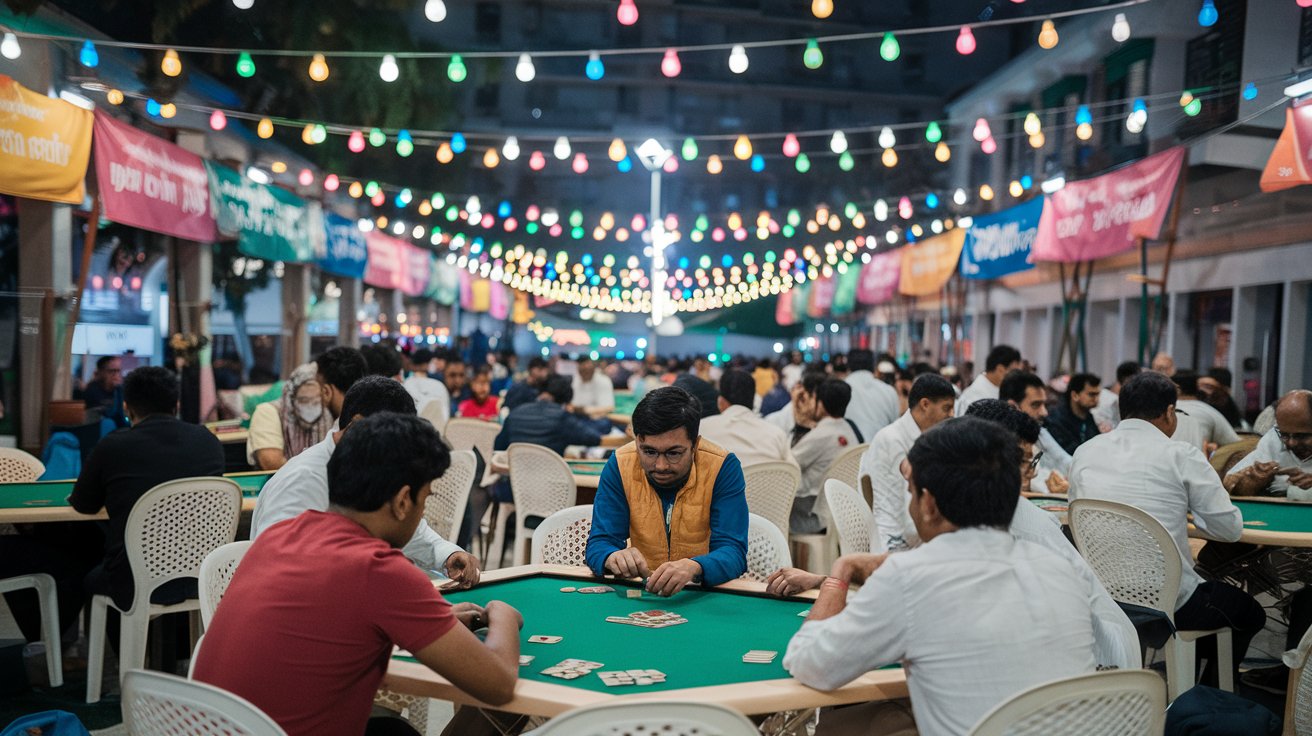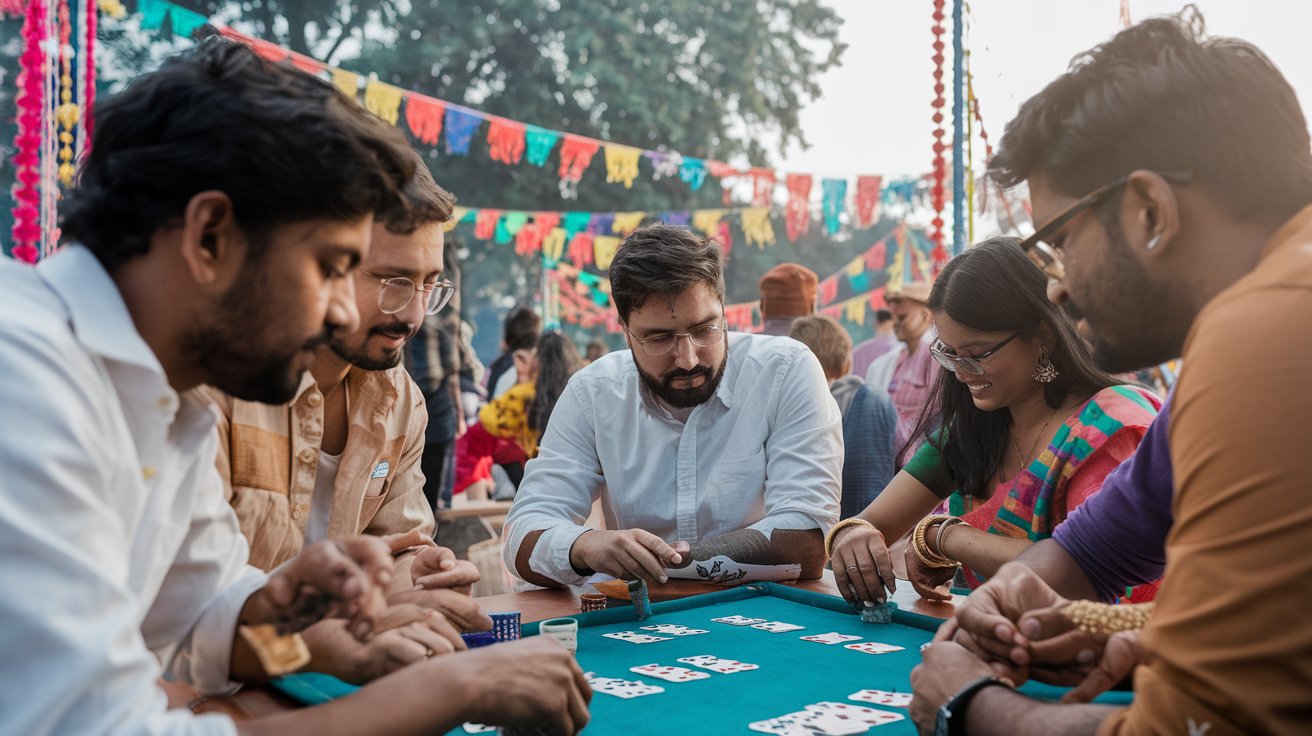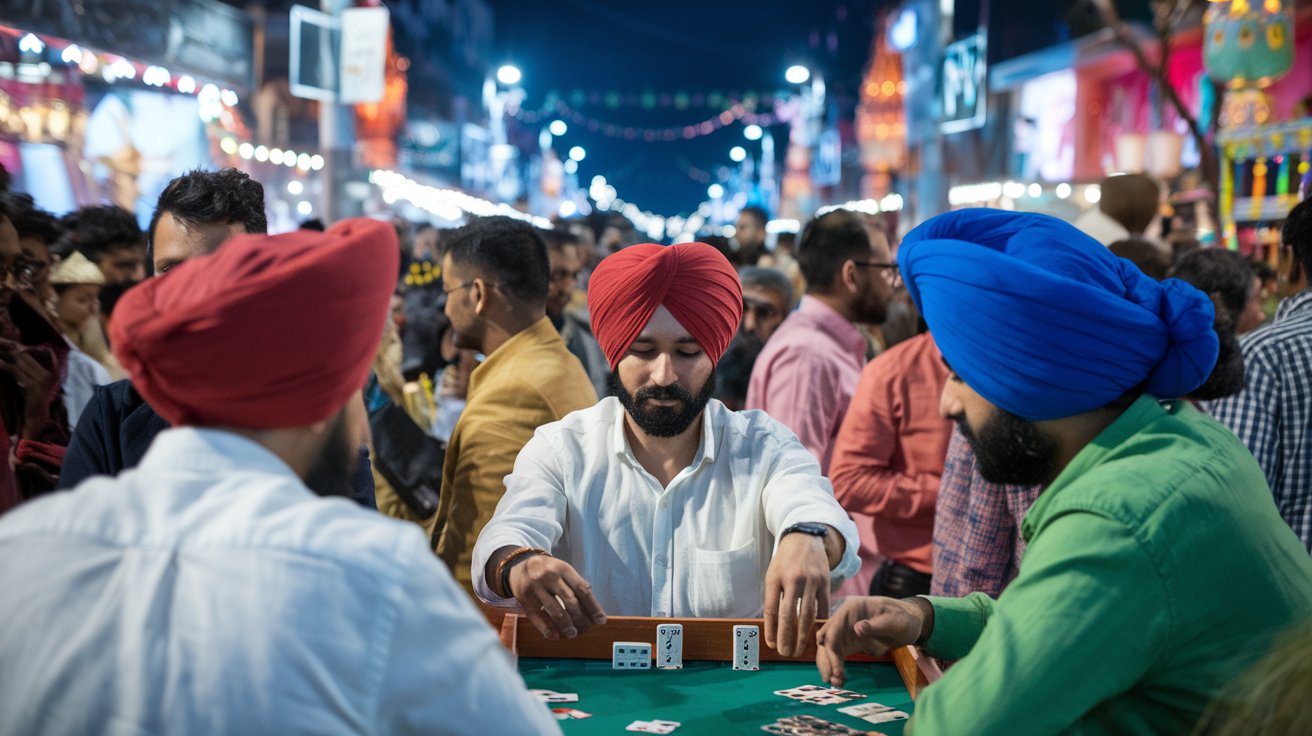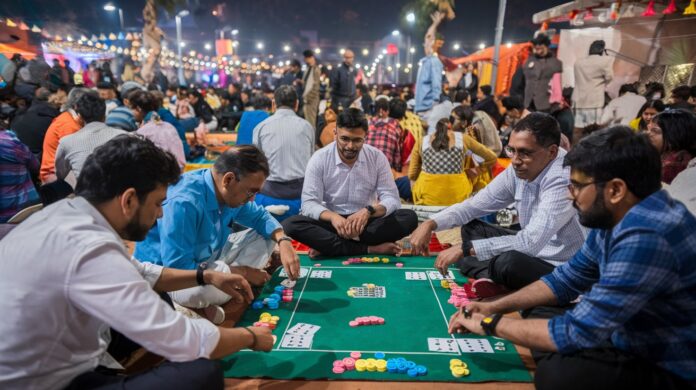As evening falls during Diwali in homes across India, something magical happens. Amid the glow of oil lamps and the lingering scent of sweets, families gather around tables covered in colorful spreads. The soft shuffle of cards and occasional bursts of laughter mark one of India’s most cherished festival traditions – playing rummy. This isn’t just any card game; it’s a ritual that has been woven into the fabric of Indian festival celebrations for generations.
Across the diverse landscape of India, from metropolitan apartments to village homes, the tradition of playing rummy during festivals creates a common thread that connects millions of families. It transcends regional, religious, and economic boundaries, bringing together grandparents and grandchildren, neighbors and relatives, in moments of joyful competition and togetherness.
But what makes this card game so special during Indian festivals? How did it become such an integral part of celebrations? And how does this tradition manifest across different festivals and regions of India? This exploration dives deep into the cultural significance of rummy during Indian festivals, revealing not just the mechanics of the game, but the heart of a tradition that continues to thrive in both traditional and modern Indian households.
The Historical Roots: How Rummy Became a Festival Staple

Ancient Connections Between Games and Celebrations
The connection between games and festivals in India dates back thousands of years. Ancient texts like the Mahabharata mention dice games played during celebrations, suggesting that competitive gaming has long been associated with festive occasions in Indian culture. These early connections laid the foundation for the integration of card games into festival traditions centuries later.
Archaeological evidence and historical records indicate that indigenous card games existed in India since at least the 16th century. However, the modern variants of rummy likely emerged from the confluence of these traditional Indian card games with European card games introduced during the colonial period.
From Colonial Import to Cultural Institution
While the exact pathway of rummy’s introduction to India remains debated among historians, most agree that the game gained significant popularity during the late 19th and early 20th centuries. As the game spread throughout the subcontinent, it began to be incorporated into festival celebrations for several compelling reasons:
- Auspicious Associations: In Hindu mythology, it is said that Goddess Parvati played games of chance with Lord Shiva on Diwali night, establishing a divine precedent for game-playing during festivals.
- Family Togetherness: Indian festivals emphasize family reunions and togetherness – rummy provided an ideal activity that could include everyone from elders to children.
- Indoor Entertainment: Many Indian festivals occur during monsoon or winter seasons when outdoor activities might be limited – card games offered engaging indoor entertainment.
By the mid-20th century, rummy had firmly established itself as a festival tradition in many Indian households, particularly during Diwali, but also extending to other celebrations throughout the year.
Diwali and Rummy: The Strongest Festival Connection

The Mythology and Beliefs
Diwali, the festival of lights, holds the strongest association with card-playing traditions in India. This connection is rooted in mythology and auspicious beliefs:
According to popular legend, on the night of Diwali, Goddess Lakshmi, the deity of wealth and prosperity, visits homes that are bright, clean, and where people are awake. Playing cards became one way to stay awake to welcome the goddess, with the added belief that those who played games on Diwali night would prosper throughout the coming year.
Another mythological connection stems from the story that Lord Shiva and Goddess Parvati played dice on Diwali night, and Parvati declared that whoever gambled on this day would prosper. While traditional gambling evolved into more skill-based games like rummy in many households, the auspicious association remained.
Diwali Rummy Traditions Across India
The tradition of playing rummy during Diwali manifests differently across various regions of India:
North India
In states like Uttar Pradesh, Delhi, and Punjab, elaborate Diwali card parties are common, where extended families and friends gather specifically for an evening of rummy. These gatherings often feature:
- Special Diwali-themed card decks
- Dedicated game rooms decorated with flowers and lamps
- Traditional snacks and beverages served throughout the night
- Small stakes that add excitement without heavy gambling
West India
In Gujarat and Maharashtra, Diwali card sessions are often preceded by a small prayer to Goddess Lakshmi. The card table itself may be decorated with auspicious symbols, and a portion of any winnings might be set aside as an offering or for charity.
South India
In states like Karnataka and Tamil Nadu, the card-playing tradition extends throughout the multi-day festival period. Different variants of rummy might be played, with Points Rummy being particularly popular in many southern communities.
Beyond Diwali: Rummy Across Other Indian Festivals

While Diwali holds the strongest association with rummy, the tradition extends to many other festivals across India, each with its unique customs:
Durga Puja and Navratri
During these nine-night festivals celebrating the goddess Durga, communities in eastern India, particularly in West Bengal, engage in evening card sessions after the religious ceremonies conclude. These games are often played among neighborhood groups who have spent the day visiting pandals (temporary temples) together.
What makes Durga Puja rummy sessions unique is their community orientation – they frequently involve neighbors and community members rather than being limited to family gatherings. The games serve as a way to extend the festive socializing into the night.
Holi
The festival of colors, Holi, frequently sees post-celebration rummy sessions. After the morning’s color play concludes, many families gather for festive meals followed by relaxed card games. These Holi rummy sessions are typically more casual and often include special Holi drinks like thandai, adding to the festive atmosphere.
Wedding Season
While not a festival in the traditional sense, the Indian wedding season (typically running from October to February) sees numerous family gatherings where rummy features prominently. In the days leading up to the wedding, when extended families gather, evening card sessions provide entertainment and help relatives from different regions bond.
Many families have specific wedding rummy traditions, including games where the bride or groom must participate, with playful stakes like the performance of wedding songs or dances by the losers.
Regional Variations: How Festival Rummy Differs Across India
The tradition of festival rummy takes on distinct flavors across India’s diverse regions, reflecting local customs and preferences:
North Indian Traditions
In northern states, Diwali rummy often involves:
- The 13-card Indian Rummy variant
- More formalized gatherings specifically organized for card playing
- The tradition of “teen patti” (three-card poker) alongside rummy
- A tendency toward slightly higher stakes, particularly in urban areas
South Indian Traditions
Southern states have developed their own unique rummy customs during festivals:
- Preference for Points Rummy variants
- Integration with other festival activities rather than standalone card parties
- Greater emphasis on skill development and strategy
- More involvement of younger players being taught by elders
Eastern Indian Traditions
In Bengal and neighboring states:
- Card sessions often follow elaborate meal services during Durga Puja
- Community involvement rather than strictly family gatherings
- Integration of cultural performances between game sessions
- Special festival-specific rule variations passed down through generations
Western Indian Traditions
Gujarat and Maharashtra feature:
- Rummy sessions that begin after worship ceremonies conclude
- The tradition of playing specifically after the Lakshmi Puja on Diwali night
- Integration of business communities where cards symbolize prosperity
- Special Diwali-specific food served during marathon card sessions
The Social Dynamics: More Than Just a Game
Intergenerational Bonding
One of the most significant aspects of festival rummy is its role in connecting generations. Unlike many modern entertainment forms that segregate by age, the rummy table welcomes players from 8 to 80, creating rare opportunities for intergenerational interaction:
- Grandparents teach grandchildren strategies and card skills
- Family stories and histories are shared between hands
- Younger players learn patience and social etiquette
- Elders stay mentally active and engaged with younger generations
Many Indians recall learning rummy from grandparents specifically during festival gatherings, creating nostalgic associations that encourage them to continue the tradition with their own children.
Gender Inclusivity
Festival rummy has historically provided an important space for mixed-gender recreation in settings where other activities might have been gender-segregated:
- Women and men participate equally at the rummy table
- In traditional households, card games offered acceptable contexts for women’s recreation
- Family rummy sessions allowed for relaxed social interaction across gender lines
- Female skill at rummy was often celebrated and respected
This inclusive nature has helped the tradition persist even as Indian society has evolved, as the game continues to offer equal footing for all participants regardless of gender or age.
Beyond Recreation: The Deeper Significance
Teaching Values Through Play
Festival rummy serves purposes beyond mere entertainment. Many parents and grandparents intentionally use these game sessions to instill important values:
Mathematical Skills
Basic arithmetic, probability assessment, and pattern recognition are naturally developed through regular play.
Patience and Concentration
The game rewards focused attention and the ability to wait for the right opportunity.
Graceful Winning and Losing
Festival rummy teaches children how to handle both victory and defeat with appropriate social responses.
Strategic Thinking
Players learn to plan ahead, adjust to changing circumstances, and make risk assessments.
In many households, festival rummy represents a rare opportunity for playful learning that bridges generational knowledge.
Preserving Cultural Continuity
As India rapidly modernizes, festival rummy plays an important role in maintaining cultural continuity:
- It provides a touchstone to traditions that remain consistent despite other changing aspects of celebrations
- The physical handling of cards creates tactile connections to previous generations who played the same way
- The ritual aspects of setting up festival card sessions reinforce cultural practices
- Game-specific vocabulary and customs preserve linguistic and social traditions
For many families, particularly those living in urban settings or abroad, maintaining festival rummy traditions provides an important connection to their cultural heritage.
Economic Aspects: From Token Stakes to Changing Patterns
The Tradition of Auspicious Gambling
In many households, festival rummy involves token monetary stakes based on the belief that gambling during certain festivals (particularly Diwali) brings prosperity in the coming year:
- Small denominations are typically used to keep the focus on play rather than profit
- Winnings are sometimes considered especially auspicious, with portions set aside for charity
- Family-specific customs determine stake levels and how winnings are handled
- Some families use special coins or tokens rather than current currency
These token stakes add excitement to the game while reinforcing cultural beliefs about auspiciousness and prosperity.
Evolution in Modern Times
The economic aspects of festival rummy have evolved significantly in recent decades:
- Many urban families have shifted to completely stake-free games, focusing on family bonding
- Others use non-monetary stakes like performing songs or tasks
- Some communities have developed charity models where winnings go to community causes
- Digital rummy platforms have introduced new economic models for traditional festival play
These evolutions reflect broader changes in Indian society while maintaining the core tradition of festival card playing.
Digital Transformation: Festival Rummy in the Modern Era
Virtual Cards, Real Traditions
The digital transformation of India has inevitably affected festival rummy traditions:
- Video calls enable geographically dispersed family members to participate in festival rummy sessions
- Online rummy platforms see significant spikes in activity during major festivals
- Digital payment systems have changed how token stakes are handled
- Mobile apps allow for festival rummy play even in settings where physical cards aren’t practical
Despite this digital evolution, many families maintain a clear preference for physical cards during festival gatherings, seeing the tangible nature of the game as an important part of the tradition.
Preserving Authenticity in Digital Spaces
As festival rummy increasingly moves into digital spaces, families and communities have found creative ways to maintain its cultural authenticity:
- Video calls are set up to show decorated rooms and festival settings, not just the cards
- Traditional foods are still shared, even if players are physically distant
- Pre-game rituals like thanksgiving prayers are maintained in online sessions
- Family-specific rules and traditions are carefully preserved in digital play
This adaptability suggests that festival rummy will continue to thrive even as the context for celebrations evolves in the digital age.
Teaching the Next Generation: Ensuring Tradition Continues
Intentional Transmission of Tradition
Many Indian families take deliberate steps to ensure festival rummy traditions continue with younger generations:
- Creating child-friendly variants with simplified rules for young players
- Sharing the mythology and cultural significance behind festival card playing
- Establishing special “junior tables” during large gatherings where older children teach younger ones
- Using festival rummy as an opportunity to share family histories and traditions
These efforts reflect the cultural value placed on maintaining this tradition across generations.
Balancing Tradition and Innovation
Forward-thinking families find ways to keep festival rummy relevant for younger generations:
- Incorporating rummy tournaments into festival celebrations
- Creating family-specific trophy systems or leaderboards
- Developing house rules that evolve with changing family dynamics
- Blending traditional physical play with digital elements that appeal to tech-savvy youth
This adaptability has been key to the tradition’s longevity and continued relevance in contemporary Indian society.
Conclusion: The Enduring Appeal of Festival Rummy
The tradition of playing rummy during Indian festivals represents far more than casual entertainment. It embodies cultural continuity, intergenerational connection, and the preservation of shared values in changing times. From the oil-lamp lit card tables of rural India to video conference games connecting global Indian families, the heart of the tradition remains consistent – creating moments of joyful togetherness during the most special times of the year.
As India continues its rapid evolution in the 21st century, festival rummy demonstrates how traditions can adapt while maintaining their cultural essence. The shuffling of cards during Diwali, Durga Puja, or family weddings continues to create the soundtrack for some of India’s most cherished memories, passing down not just a game, but a profound cultural experience from one generation to the next.
Whether played with antique cards handled by generations of the same family or on the latest smartphone app, festival rummy remains a testament to India’s ability to preserve its cultural heart even as its external expressions evolve. In the simple act of gathering around a card game during festivals, millions of Indians continue to honor their past while creating memories for their future – one shuffle, one deal at a time.

Zareb Saleh is a journalist at Gulf Today and a ghostwriter for Gameoholic, specializing in gaming, technology, and digital culture. With a keen eye for industry trends, he delivers insightful stories that engage and inform readers.




